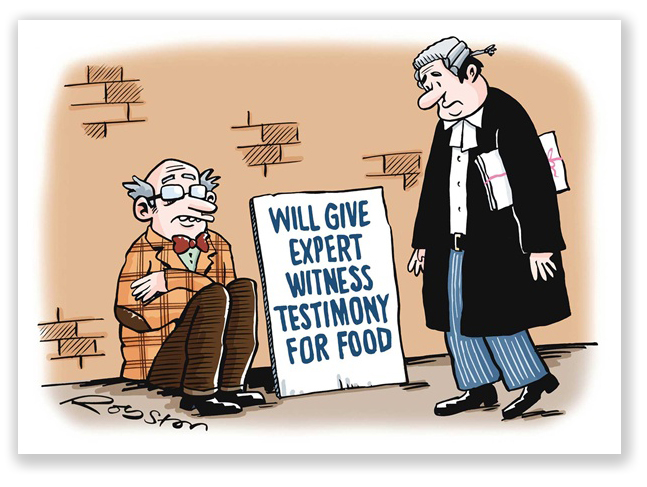We post news and comment on federal criminal justice issues, focused primarily on trial and post-conviction matters, legislative initiatives, and sentencing issues.

WHERE THERE’S A ‘WILL’ THERE’S A ‘WON’T’
 One of our favorite Supreme Court decisions last June was Loper Bright Enterprises v. Raimondo, a case that punched Chevron deference’s ticket by holding that courts don’t have to defer to agencies’ interpretations of federal law as long as those interpretations are reasonable. Instead, Loper Bright held, courts are in the business of figuring out what statutes say, and they should not defer to a bunch of unelected bureaucrats who often have a vested interest in the interpretations they put on the laws the agencies are supposed to administer.
One of our favorite Supreme Court decisions last June was Loper Bright Enterprises v. Raimondo, a case that punched Chevron deference’s ticket by holding that courts don’t have to defer to agencies’ interpretations of federal law as long as those interpretations are reasonable. Instead, Loper Bright held, courts are in the business of figuring out what statutes say, and they should not defer to a bunch of unelected bureaucrats who often have a vested interest in the interpretations they put on the laws the agencies are supposed to administer.
We saw the dark side of Loper Bright last Friday. The day after the 6th Circuit heard oral argument in a case over whether the Sentencing Commission’s guideline, USSG § 1B1.13(b)(6) – that says an extraordinary and compelling reason for a compassionate release may include an overly-long sentence that could not be imposed today because of a change in the law – exceeds the Commission’s authority.
In the First Step Act, Congress reduced the mandatory minimums for some drug offenses and refined 18 USC § 924(c) to provide that the 25-year minimum for a second § 924(c) offense could only be imposed after a prior § 924(c) conviction. Before First Step, if you carried a gun when you sold pot on Monday and then carried it again when you sold pot on Wednesday, you would get maybe 60 months for selling drugs AND a mandatory consecutive 60 months for carrying a gun on Monday AND a mandatory consecutive 300 months for Wednesday’s gun. Your two-day drug selling binge would have netted you 420 months (35 years) in prison.
 For reasons more political than legal, Congress did not make the changes in drug and § 924(c) mandatory minimum sentences retroactive. But in the years since, some judges found that the fact that some people were serving impossibly long sentences that they could not have had imposed on them after First Step passed could constitute an extraordinary and compelling reason for grant of a compassionate release motion. Other Circuits, notably the 3rd, 7th and 11th, ruled that overly long sentences could not serve as extraordinary and compelling reasons for compassionate release because Congress had not made the changes to the laws that dictated those sentences retroactive.
For reasons more political than legal, Congress did not make the changes in drug and § 924(c) mandatory minimum sentences retroactive. But in the years since, some judges found that the fact that some people were serving impossibly long sentences that they could not have had imposed on them after First Step passed could constitute an extraordinary and compelling reason for grant of a compassionate release motion. Other Circuits, notably the 3rd, 7th and 11th, ruled that overly long sentences could not serve as extraordinary and compelling reasons for compassionate release because Congress had not made the changes to the laws that dictated those sentences retroactive.
When the Sentencing Commission finally adopted a new Guideline – § 1B1.13 – a year ago, it included as one of the defined extraordinary and compelling reasons for a compassionate release grant a case where a defendant had a disparately long sentence because of a nonretroactive change in the law. The Dept of Justice began a full-throated attack on subsection (b)(6), arguing that because First Step does not make the changes in § 924(c) retroactive, the Commission was exceeding its authority by letting people do an end run around Congress.
A 6th Circuit panel heard oral argument last week in United States v. Bricker, three consolidated cases in which the government is arguing that subsection (b)(6) exceeds the Sentencing Commission’s congressionally delegated authority. The next day, in United States v. Rutherford, a 3rd Circuit panel held that subsection (b)(6) is invalid.
The Rutherford defendant won a compassionate release after 20 years of being locked up on a 42-year sentence for two armed robberies of a doctor’s office. Citing its right under Loper Bright to ignore the Sentencing Commission’s interpretation of the extent of its authority, the Rutherford panel ruled against Mr. Rutherford based on its belief as to “the will of Congress”:
Subsection (b)(6)… as applied to the First Step Act’s modification of § 924(c), conflicts with the will of Congress and thus cannot be considered in determining a prisoner’s eligibility for compassionate release. Congress explicitly made the First Step Act’s change to § 924(c) nonretroactive… [I]t would be inconsistent with [the] pertinent provisions of the First Step Act… to allow the amended version of § 924(c) to be considered in the compassionate release context because Congress specifically decided that the changes to the § 924(c) mandatory minimum sentences would not apply to people who had already been sentenced.
Ohio State University law professor Doug Berman, writing in his Sentencing Law and Policy blog, criticized the 3rd’s decision. “Besides the non-textual nature of divining the “will” of Congress to rule against a defendant, this holding conflates Congress’s nonretroactivity decisions in the First Step Act with its decision, in the very same Act, to expand access to compassionate release and to keep in place the broad parameters of USSC authority to set terms for compassionate release. There is nothing at all “inconsistent” with Congress saying not everyone should automatically retroactively benefit from a particular change in law and the USSC saying that judges can consider a change in law for a select few pursuing another legal remedy.”
 A cardinal canon of statutory construction holds that where the text of a statute is clear, that’s all that matters. But Rutherford holds in essence that what the court thinks Congress “willed” is more important than what the law Congress passed actually says.
A cardinal canon of statutory construction holds that where the text of a statute is clear, that’s all that matters. But Rutherford holds in essence that what the court thinks Congress “willed” is more important than what the law Congress passed actually says.
A Fifth Circuit panel has already held that subsection (b)(6) is a legitimate exercise of Commission authority. Prof Berman believes it is “inevitable” that the issue will have to be settled by the Supreme Court.
United States v. Rutherford, Case No. 23-1904, 2024 U.S. App. LEXIS 27740 (3d Cir., November 1, 2024)
United States v. Bricker, Case No. 24-3286 (6th Cir., argument held October 31, 2024)
Sentencing Law and Policy, Based on “the will of Congress,” Third Circuit panel adheres to prior ruling limiting ground for compassionate release (November 1, 2024)
United States v. Jean, 108 F.4th 275 (5th Cir., 2024)
– Thomas L. Root




